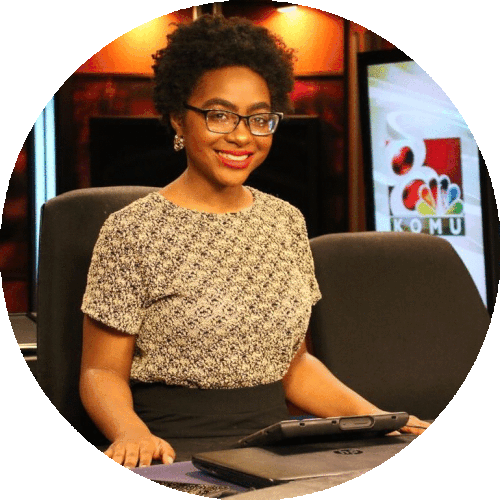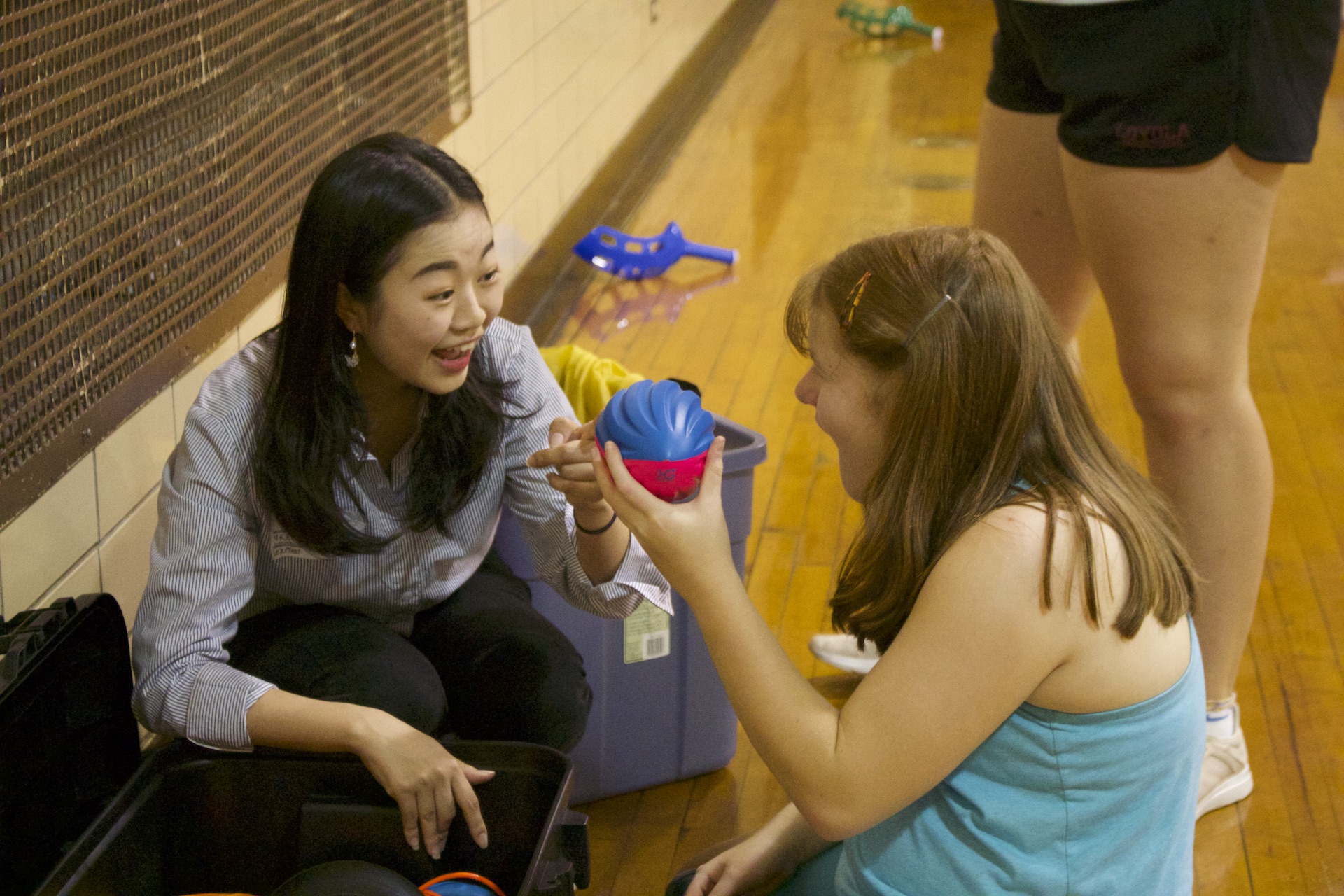Recreational program for kids with disabilities is hoping to expand reach with annual fundraiser
A KEEN Chicago session at Loyola Park winds down with parachute fun with the athletes.
For a lot of people the most vivid memories of growing up, the ones that can often leave the firmest impressions, include the hazy recollections of playtime. Being able to kick a ball around in the sun, run around a park with a schoolmate, jump rope while kicking up dust or swimming during the summer, as simple as they seem, can be important milestones in the development of a healthy, happy child. However, many kids with disabilities aren’t often afforded the same opportunities for recreation and fun that able-bodied youth are. Laura Fillenwarth, a social worker and the only staff member of KEEN Chicago is trying to change that.
Nearly 140 youth with disabilities around the city attend sports, arts, swimming and trampoline programs free-of-charge at KEEN Chicago, a non-profit aiming to provide the non-competitive physical enrichment and athletic opportunities that are often difficult to find elsewhere for families raising a child with disabilities.
“The families that are coming to us, they don't have access to a lot of other services or supports,” Fillenwarth said. “They don't have a lot of other places where their kids, you know, are accepted or included. For a lot of the families, they might sign up and maybe even don't come to session for a while because they feel very nervous, because they've had bad experiences where they tried something and they felt very isolated. So this is really like a community space for them where they can come and, you know, just be kids and have fun.”
Jody Herrera, whose son, Danny, has autism and is in the KEENquatics program, says the program being free is a huge benefit to families like theirs.
“The wonderful thing is [that] it’s free to families and we pay so much for different therapies and everything else,” Herrera said. “It’s nice that somebody is doing something for the kids that parents don’t have to struggle to pay for. We've had to drop different programs before because they've been $50 a session or $25 a session. You just can't do everything and it's just nice that this is all free for the family. So it makes a big, huge difference.”
According to Fillenwarth, it can be expensive to have a child with a disability, It’s for this reason Fillenwarth emphasized why it’s important to have the program be free to families.
“We do, in our program, have a lot of families who are low income and don't have a lot of other access to programs and supports or a lot of other places, if any place that will accept or accomodate, you know, their children,” Fillenwarth said. “So, KEEN Chicago, we really work to create a space that's open and welcoming and accommodating and accepting for our kids. For many of our families, it's the only space that they have. So this program is incredibly important. It’s a community and so since it is free for our families, we do rely on donations and corporate sponsorships to fund the program. In such a small program, every donation goes straight back into the program. It’s used to, you know, go directly back to the kids.”
Being the only staff member of KEEN Chicago can sometimes be challenging Fillenwarth says. Managing the many programs the nonprofit has whilst caring for her own child with different needs can be hard work. But, she says, the KEEN community makes everyday worth it.
“It can be very isolating to have a disability or have a family member with a disability and there’s not a lot of support which are available,” Fillenwarth said. “My own daughter has a rare disease so I know from personal experience how important having a support community like this is. So it’s very meaningful for me, personally, that so many people would come together and support this effort.”
A KEEN Chicago volunteer helps a KEEN athlete pick out an activity for the day.
KEEN Chicago, which started in 2005, is just one of seven KEEN programs across the country, including New York, St. Louis, San Francisco, L.A., Phoenix, and the Washington, D.C. area. KEEN was originally modeled after a similar program established in Oxford, England by Elliott Portnoy, who later brought it to the D.C. area in 1992. Now KEEN Chicago serves about 140 Chicago youth, a number it’s hoping will soon increase in the coming year.
With KEEN welcoming kids with physical disabilities, intellectual disabilities, autism, and more, Fillenwarth believes it’s important to let the kids at KEEN lead.
“You can just engage with them on what they enjoy,” Fillenwarth. “They’ll guide you to what they like and I think that’s really important because the children that we’re working with don’t have a lot of choices in their everyday life. So to provide them an opportunity where they can make about what they want to do and also naturally develop friendships, if they want to play with other kids, they’ll have some support in doing that which I think is really empowering and very powerful.”
Volunteers like Luke Sherill, who has been working with KEEN for the last two and a half years, make up the bulk of KEEN Chicago’s workforce. According to Sherrill, the non-profit has been instrumental in transforming him into a better person. Sherill says that before coming to KEEN, he was “a vapid, self-absorbed jerk” and needed to find a way to get out of his own head.
“I started looking for places to volunteer but a lot of volunteer organizations I found were kind of superficial,” he said. “Then I found KEEN which was something that was really interesting because children terrify me and being around them was complete anxiety. And I thought that the best way to volunteer was to do something that scared me and that made me uncomfortable. That way I could completely take myself out of it.”
Sherrill says it took him around a year and a half to get completely comfortable around the kids at KEEN, which was helped by Laura’s involvement.
“Laura actually has a really good way of turning up the temperature until you don’t know you’re on fire,” Sherril said. “So, every session she gave me a little bit more, a little bit more, a little bit more until I was like ‘wait, I’m actually doing a lot here.’”
Herrera’s son, Danny, is one of the program participants that Luke has developed a special bond with since coming to KEEN, which she originally heard about at her son’s school. Herrera says having people like Luke, who started as a regular volunteer, show up each week makes a big difference for their family.
“We don't say we're going to KEEN; we say we're going to go to swimming with Luke,” Herrera said. “When we're at home, I'm like ‘are you ready to get ready to go swimming with Luke’ and he's like ‘yes’, you know. So right away, he like stops, what he's doing, goes upstairs, and changes. [Usually] it's hard for him to transition because he likes being at home. He's a homebody and they get him to leave to do something, you know, probably come here every two weeks. So it's really great.”
As a free program that provides services to over a hundred Chicago youth like Danny, Fillenwarth says the upcoming KEENFest 2019 event on October 18th will be where a huge portion of the funding for the new year comes from.
A KEEN athlete enjoys playtime with a volunteer during the KEEN Sports program at Loyola Park.
“The money we raise [each year is used] to pay the fee that we pay to use the gym, to pay for the equipment, etc., and it doesn’t get sucked into a black hole or the headquarters to cover overhead costs. It’s very lean and it’s 100% focused on getting the money back into support programs like this.”
The fundraiser, which will provide a majority of the funding for KEEN Chicago in 2020, will include a scavenger hunt, a wine pick, food and beverages, as well as appearances from Chicago Fire soccer player Jeremiah Gutjahr, who will be co-hosting the event along with Emma Pfiefer from the Chicago Luvabulls and Keith Puckett, CEO of Ensnare.
Jamie McQueen, a member of the KEEN Chicago Board of Directors, says he hopes the event will help boost the number of kids the nonprofit is able to benefit.
“We’d like to get that number up to 200,” said McQueen. “We think we can do it but we’re limited by our ability to really access contributions, donations, for financial support to help support the group and grow the staff of one. We’re hoping to exceed our goal so that we can support that many more smiles.”
McQueen does believe, however, money isn’t the only thing interested parties can donate to KEEN Chicago.
“Time is the most precious commodity anyone has and the most precious gift someone can give to another is donating your time,” McQueen said. “That’s what you see [at KEEN]. It’s very invigorating and very encouraging. Come see for yourself.”
More information on KEENfest 2019, being held on October 18th, and how to donate can be found here. Those looking for how to get their child involved with KEEN Chicago can go to the organization’s website.




